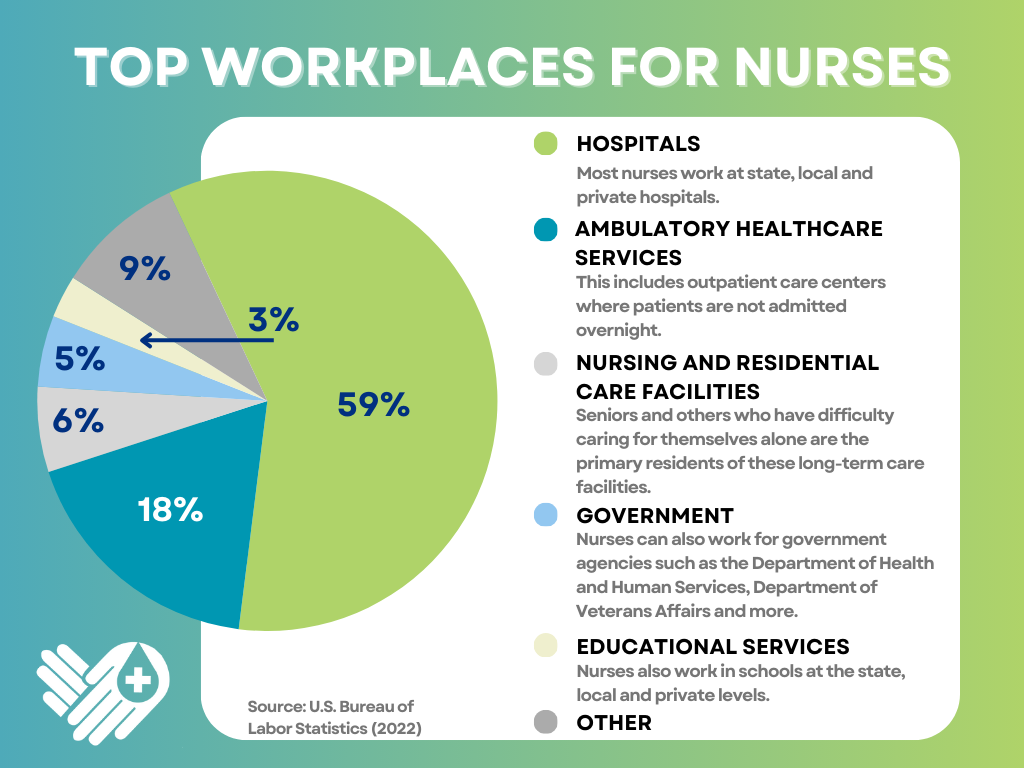American Association of Colleges of Nurses (AACN) can help you find accredited nursing degree programs and professional development resources.
Registered Nurse Career and Degree Guide
- Registered Nurse Overview
- Duties
- Salary
- Education
- LPN-to-RN Programs
- Paramedic-to-RN Programs
- Continuing Education for Nurses
Related Reading
A registered nurse (RN) is a nurse who has completed an Associate Degree in Nursing (ADN) or a Bachelor of Science in Nursing (BSN) and has then taken a test that is required to earn RN credentials. In other words, you can earn an ADN or BSN degree to become licensed as an RN.
In this Article
What Is an RN (Registered Nurse)?
Typically found in hospitals, medical offices, and clinics, a registered nurse assists doctors and other nurses in providing critical care to patients.
As one of the most versatile roles in the nursing industry, registered nurses (RNs) are in high demand. Working as an RN can be incredibly rewarding and impactful, as well as a great stepping stone if you decide you want to advance your career.
Steps to Becoming a Registered Nurse
The path to becoming an RN takes a little time, but the journey is a rewarding one. It’s a bit like getting a driver’s license in that you study and practice, take the test, and apply to get your license. Let’s go over the registered nurse requirements that await you.
Decide if this career is right for you.

A job as an RN comes with a lot of responsibility. No matter where you work or the type of nursing role you pursue, you’ll likely be working closely with patients. You’ll need to be quick on your feet, approachable, and good with people.
Complete your prerequisites.

You’ll need to have a high school diploma or GED in order to apply for a nursing program. Some schools will accept students with a GPA of 2.5, while others require a 3.0 or higher. As you’d expect, the most in-demand schools require the highest GPAs.
Choose a nursing program.

Registered nurses need to hold either an Associate Degree in Nursing (ADN) or a Bachelor of Science in Nursing (BSN) to work as an RN. ADNs allow nurses to enter the workforce sooner and cost less because of their shorter program length, which typically lasts about two years. While most employers prefer to hire those with BSNs, earning an ADN can be a good way to get started in the nursing field with an education pathway that is generally quicker and less expensive.
A BSN usually takes about four years to complete and will cost more, but you’ll receive a more in-depth education desired by employers. You should take into account your personal career goals, time commitment and financial situation when choosing a program. It is also an option to earn your ADN first and then get your BSN later.
Make sure that whichever degree program you choose is accredited by either the Commission on Collegiate Nursing Education (CCNE) or the Accreditation Commission for Education in Nursing (ACEN).
Complete required clinical externship.

All nursing programs will have in-person, clinical training where you get to practice the skills you’ve learned with a real patient. These clinical experiences are required to graduate.
Earn your degree.

No matter what degree you choose, you’ll take classes in a variety of subjects including anatomy, physiology, microbiology, chemistry, nutrition, psychology and more. Accredited ADN and BSN programs are designed to give you the skills and knowledge needed to pass the NCLEX-RN exam.
Take and pass the NCLEX-RN exam.

Following graduation from an approved program, all U.S.-based RNs must take and pass the NCLEX exam administered by the National Council of State Boards of Nursing (NCSBN). The test is used to determine whether you’re prepared for entry-level nursing and includes a minimum of 75 questions. You’ll answer up to 265 questions if you haven’t reached a passing score after the first round.
Get your RN license.

Once you’ve passed the NCLEX exam, you can apply for RN licensure in the state where you want to work. Each state has its own requirements, fees, and length of time that it takes to obtain a license, so you’ll need to do a little bit of research. Another option to consider is the Nurse Licensure Compact (NLC). This initiative allows nurses to get a multi-state license and practice in any state that is a member of the alliance. There are 34 states that have enacted NLC legislation. The NLC is a particularly good option for RNs who think they may want to pursue a career in travel nursing within the U.S.
Start working as an RN.

Once you’ve been working for a while as an RN, you’ll be able to figure out what you love—and what you don’t love—about being an RN. You might decide to try your hand in a doctor’s office or clinic instead of a hospital. Now is your time to explore your options.
Keep up on your continuing education requirements.

RNs are required to take a minimum number of continuing education units (CEUs) each year to maintain their license. Be sure you know what’s required in your state.
How Long Does It Take To Become an RN?
The time it takes to earn a nursing degree depends on the RN program you choose. We can still answer the how many years to become an RN question by starting at the beginning and moving up the ladder.
The minimum degree needed to be an RN is an ADN, which typically takes two years to complete. A BSN, on the other hand, takes about four years to complete but provides a more comprehensive nursing education. Nurses with BSNs, therefore, tend to be more qualified for higher-level positions, which can yield a higher salary. However, an ADN can get you into the workforce sooner and generally costs less because it is a shorter program.
If you already have some nursing education as a licensed practical nurse (LPN) or a paramedic, there are LPN-to-RN and paramedic-to-RN bridge programs if you want to transition to being an RN. These programs allow you to earn either an ADN or BSN in less time because of your prior education.
If you already hold an ADN and want to pursue a BSN, you may be able to do so in a shorter time than it would take to earn a typical bachelor’s degree through an RN-to-BSN program.
A Day in the Life of a Registered Nurse
As just about any healthcare professional will tell you, no two days on the job are ever exactly the same in the life of a nurse. And with so many different types of nursing jobs out there, it can be difficult to describe what a typical day looks like for any nurse.
That being said, there are some common routines for many nursing jobs that can give us an idea of what it’s like to walk in a nurse’s shoes for a day.
For example, nurses typically begin their shifts by conferring with the nurses on shift before them about patient updates, new admittances, and any other crucial information. Then they may review physician notes and lab results to prepare them for who they will see that day.
Then it’s time to make the rounds. Nurses will visit their patients and assess their progress, administer any medication they may need and provide them with any other treatment that has been assigned to them. They may provide updates to patients about lab results or other emerging information regarding their health.
Eventually, nurses need a break, and then it’s back to patient care. If any emergency situations present themselves, those must be addressed right away.
At the end of their shift, nurses will relay any updates to the nurses next on shift and make sure their notes are updated as well.
Pros and Cons of Being an RN
Nursing has the potential to be both a rewarding and demanding career. All jobs have their ups and downs, but these are just a few to consider if you are thinking about becoming an RN:
Pros
Cons
What Types of Roles are Available for RNs?
There are many roles registered nurses can fill, from pediatric nurses who see children for routine wellness exams to operating room nurses who help prep patients for surgery and assist the operating team during procedures. There are even roles with indirect patient care, such as utilization review nurses, who act as a liaison between insurance company and patient to ensure thay have the right coverage for a medical procedure or ongoing condition.
There are ways for working paramedics to become RNs, too.
Where Can RNs Work?
Most RNs work in hospitals, medical offices, nursing homes, home healthcare services, and outpatient clinics. Some RNs work from home or in a clinic setting and see patients virtually as a telehealth nurse. But you can also find them in a number of other locations as well, such as schools, churches, government offices, insurance companies, community centers, day spas, and more.

How Much Could an RN Earn?
The salary of an RN can vary greatly depending on their specialty, level of education and experience, additional certification, and workplace location.
Salaries are also dependent on where in the U.S. you live. Top-paying locations include California, Hawaii, Washington, Alaska, and Oregon, says the U.S. Bureau of Labor Statistics.
Resources for Current and Prospective RNs
There is an abundance of resources for nurses that can help you find education programs, determine how to get licensed in your state, provide you with information on career advancement and much more.
Accreditation Commission for Education in Nursing (ACEN) is another resource that can help you find accredited nursing degree programs.
NCLEX from the NCSBN is your best resource to learn about the NCLEX exam, including how to register and prepare for the test.
Association for Nursing Professional Development (ANPD) provides members with a host of professional development opportunities and resources.
National Council of State Boards of Nursing (NCSBN) has everything you need to know to get licensed as an RN.

